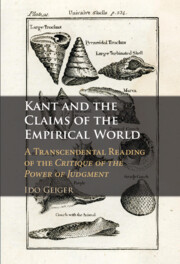 Kant and the Claims of the Empirical World
Kant and the Claims of the Empirical World Book contents
- Kant and the Claims of the Empirical World
- Kant and the Claims of the Empirical World
- Copyright page
- Dedication
- Epigraph
- Contents
- Acknowledgments
- Abbreviations
- Introduction
- Chapter 1 The Charge of Reflective Judgment and the Conceptual and Aesthetic Purposiveness of Nature
- Chapter 2 Organisms, Teleological Judgment and the Methodology of Biology
- Chapter 3 The Antinomy of Teleological Judgment
- Chapter 4 Discursivity and the Conceptual Purposiveness of Nature
- Chapter 5 The Significance of Form and the Aesthetic Purposiveness of Nature
- Conclusion: Kant’s Empiricism
- References
- Index
Chapter 5 - The Significance of Form and the Aesthetic Purposiveness of Nature
Published online by Cambridge University Press: 30 April 2022
- Kant and the Claims of the Empirical World
- Kant and the Claims of the Empirical World
- Copyright page
- Dedication
- Epigraph
- Contents
- Acknowledgments
- Abbreviations
- Introduction
- Chapter 1 The Charge of Reflective Judgment and the Conceptual and Aesthetic Purposiveness of Nature
- Chapter 2 Organisms, Teleological Judgment and the Methodology of Biology
- Chapter 3 The Antinomy of Teleological Judgment
- Chapter 4 Discursivity and the Conceptual Purposiveness of Nature
- Chapter 5 The Significance of Form and the Aesthetic Purposiveness of Nature
- Conclusion: Kant’s Empiricism
- References
- Index
Summary
Chapter 5 argues that the feeling of harmony expressed by pure aesthetic judgments is to be understood as the promissory feeling that a sensible manifold can be brought under concepts. The manifold which evokes in us this particular feeling of cognitive purposiveness makes us subconsciously identify it as an object exemplary of a natural kind, even before we have found concepts under which to subsume it and its kind. Furthermore, it is only on the assumption that the same manifolds will bring about this feeling in all of us that we will be able to make cognitive judgments about the same objects. Pure aesthetic judgments underwrite our pre-conceptual identification of spatial forms as exemplary of objective natural kinds. It is a necessary condition of cognition that we carve up the manifold given to us in intuition into objects exemplary of natural kinds in the same manner. The assumption of a common sense is a necessary condition of objective empirical experience and knowledge. It grounds the appeal to universal assent, which aesthetic judgments express. The Critique of the Aesthetic Power of Judgment is an essential part of the transcendental account of the conditions of empirical experience and knowledge.
Keywords
- Type
- Chapter
- Information
- Kant and the Claims of the Empirical WorldA Transcendental Reading of the <I>Critique of the Power of Judgment</I>, pp. 138 - 199Publisher: Cambridge University PressPrint publication year: 2022


